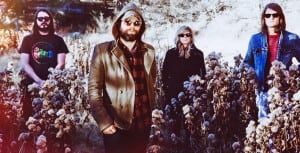Psychedelic rock advocates, The Black Angels, play Burgerama 4 at The Observatory, which runs March 28 and 29. Check the venue for day/time details.
Often droning and trance-like with exploding guitar sounds and riffs, organ grooves, and emotionally dark and light vocals, the Austin band’s rhythms add to the musical experience, leading an audience to take the ride with them.
Concert Guide Live spoke with vocalist Alex Maas about the psych movement, working with Roky Erickson, who will also be performing at Burgerama 4, and more.
CGL: What do you think got this current psychedelic movement going?
AM: It’s something that the community started. Something that the fans backed up and started, too. It’s like a very communal vibe. This wouldn’t have happened if people listening to music around the world didn’t want it to happen.
I think it’s great for the music scene all over to have the underground being the psych scene. Hip hop artists and pop musicians these days are looking into the psych world for new stuff. You look to the underground for the cool shit that happens. I can’t wait to see what bands come out of this.
CGL: What inspired you to gravitate to this type of music?
AM: Maybe because the way it sounded, honestly. Getting into psych music, especially in the beginning, I would discover a band and I would discover who they were listening to and it branched out into this big tree, like a central nervous system. That discovery process is always really fun to me.
CGL: What was it like playing a Black Angels set followed by a set as Roky Erickson’s backing band on Halloween 2008 at the El Rey?
AM: You can’t ask for more. It was such an honor to be asked to play with someone like Roky Erickson. When we got the offer we were like wow this is awesome we’re going to play all 13th Floor Elevator songs. But the truth is, Roky hadn’t played a lot of songs in 30 or 40 years so he had a whole other catalogue and he wanted to focus on the whole shebang.
It took several months to learn his new material and kind of Black Angelize it and turn it into something that we felt comfortable playing. We’re not really a band that will do cover songs of other bands and sound like them. But being on stage and really seeing how therapeutic the music was for him and to see how he transformed before and after the show was a real pleasure to see.
CGL: What did you find interesting or surprising when you worked with Roky?
AM: I found it surprising and really interesting when we would go into the studio and sometimes it would seem like Roky didn’t really want to be there. Sometimes he’d be a little cloudy, or maybe he’d rather just be doing other things. And we’d be playing these songs, teaching these songs, and considering Roky’s age and everything he’d been through he was probably like, ‘why do I need to do this? I’d rather be at home watching cartoons.’
Playing his music, his eyes would become more focused and his mind more clear. After the sessions with him it was really easy to talk to Roky. Music kind of lifted up a veil and we could talk to him about his past and his youth and when the songs were written. Then as we got further and further away from the session musically, the veils slowly went back down and he became slightly extroverted again.
CGL: The Black Angels song “Always Maybe” sounds like it has a faint jug sound in the background reminiscent of the 13th Floor Elevators. What is it?
AM: It’s a backward vocal we manipulated to sound like a jug. It sounds kind of like a quail (mimics the sound). I think that was just me singing into the microphone to make effects and it ended up sounding like this bubbly thing. We ‘re trying to figure out how the hell to do that live.
CGL: When did you realize you wanted to do music?
AM: I still try to piece that together myself. I got into music kind of late in life. I took a piano lesson and a guitar lesson when I was 10 or 11 and I just wasn’t good. It just seemed like a lot of work and I’d rather be doing other things. I’d rather be playing outside. I’d rather be running through the woods and doing what boys like to do. So I didn’t ever play music as a passion until my 20’s.
I grew up in a nursery, a plant nursery, and my dad collected animals and he had lots of exotic birds. I remember hearing all of those animals and birds and trying to mimic them when I was younger. I think doing that helped me set up this kind of weird musical ear for what I could do and what I could possibly make exist. I think that first onomatopoeic connection had to have been when I was a child, growing up and seeing the world through nature’s eyes and not through the eyes of a piano player or guitar player.
My parents used to always play music at the nursery, too. In walking around the nursery I’d always have this magical, musical experience. I’d walk by a waterfall and I’d hear this music playing, I’d walk past some exotic African Crowned Crane bird then in the background I’d hear the wind blowing through the trees.
Music was never something that felt like work. It was always something I did because it felt good. If it feels good sometimes you just have to do it again if it’s not harming anybody.
